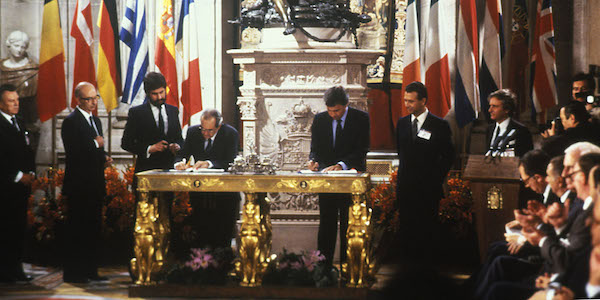Summary
This article seeks to commemorate thirty years of Spanish membership of the European Union by providing an account of the evolution of the country’s relationship with the European integration process from its origins to the moment of accession in 1986.
Introduction
This article seeks to commemorate thirty years of Spanish membership of the European Union by providing an account of the evolution of the country’s relationship with the European integration process from its origins to the moment of accession in 1986. In doing so, it will dwell at some length on the dilemmas facing an authoritarian regime that struggled to adapt to a hostile European political environment while seeking to benefit from the consequences of unprecedented economic growth and prosperity on the continent. In turn, this will allow us to examine the EC’s efforts to develop a consistent policy towards a dictatorship that was almost universally detested by European democratic opinion but nevertheless tolerated (and occasionally courted) by member state governments competing for access to an increasingly attractive market. In this regard, the EC’s relations with the Franco regime constitute an interesting case study in the dilemmas of democratic conditionality as experienced by an international organisation that had not yet had the opportunity to develop a coherent policy of democracy promotion. As we shall see, the relatively tough line taken by the EC in dealing with a non-democratic regime such as Franco’s was to a have a lasting impact on Spanish public opinion, and in particular on public perceptions of the nature of the European integration project as a whole. This partly explains the enormous political significance that was attached to EC membership during Spain’s transition to democracy in the wake of Franco’s death, which is also examined here in some detail. Indeed there is reason to believe that a majority of Spaniards continued to support the goal of EC membership throughout a lengthy and often frustrating negotiating process (1977-85) precisely because of the political significance it had acquired over the years. In turn, this probably also accounts for the relative ease with which successive governments were able to carry out painful structural reforms that were generally justified in terms of the need to prepare the Spanish economy for the rigours of EC membership.
Charles Powell
Director, Real Instituto Elcano | @CharlesTPowell
(Signing of the Accession Treaty of Spain (1985) / Photo: European Commission)



